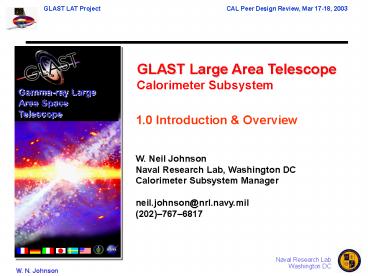GLAST CAL Peer Design Review - PowerPoint PPT Presentation
1 / 11
Title:
GLAST CAL Peer Design Review
Description:
GLAST LAT Project CAL Peer Design Review, Mar 17-18, 2003. W. N. Johnson ... 2002 Integral IBIS (CsI(Tl) PIN diodes) CsI Calorimeters in High Energy Physics ... – PowerPoint PPT presentation
Number of Views:20
Avg rating:3.0/5.0
Title: GLAST CAL Peer Design Review
1
GLAST Large Area Telescope Calorimeter
Subsystem
1.0 Introduction Overview W. Neil
Johnson Naval Research Lab, Washington
DC Calorimeter Subsystem Manager neil.johnson_at_nrl
.navy.mil (202)7676817
2
Outline
- Introduction
- LAT Overview
- Calorimeter Subsystem
- Level III Requirements
- Design Heritage
- Reviews, Status of PDR RFAs
- Changes since Delta PDR
3
Instrument Design 4x4 modular array
Si Tracker pitch 228 µm 8.8 105 channels 12
layers 2.8 X0 4 layers 19 X0 2 layers
ACD Segmented scintillator tiles 0.9997
efficiency
? minimize self-veto
Mechanical Sys. (inc. Grid Thermal Radiators)
3000 kg, 650 W (allocation) 1.75 m ? 1.75 m ?
1.0 m 20 MeV 300 GeV
CsI Calorimeter Hodoscopic array 8.4 X0 8
12 bars 2.0 2.7 32.6 cm
Flight Hardware 16 Tracker Flight Modules 16
Calorimeter Modules 1 Flight Anticoincidence
Detector Data Acquisition Electronics Flight
Software
- cosmic-ray rejection
- shower leakage
- correction
Electronics, Data Acquisition, Flight Software
4
Calorimeter Module Overview
Modular Design 4 x 4 array of calorimeter modules
- Each Module
- 8 layers of 12 CsI(Tl) Crystals
- Crystal dimensions 27 x 20 x 326 mm
- Hodoscopic stacking - alternating orthogonal
layers - Dual PIN photodiode on each end of crystals.
- Mechanical packaging Carbon Composite cell
structure
- Electronics boards attached to each side.
- Electronic readout to connectors at base of
calorimeter. - Outer wall is EMI shield and provides structural
stiffness as well.
5
Development of Electromagnetic Shower in the
GLAST Calorimeter
- Simulation of 2 GeV electron entering calorimeter
from the top. - Grid represents the segmentation of the
calorimeter into 3 cm blocks - Color coding shows the projected total energy
deposited in 2 mm voxels in MeV. - Maximum energy loss rate (shower max) occurs at
depth of 10 cm.
6
CAL Level III Requirements
Reference LAT-SS-00018
7
CAL Level III Requirements (cont)
Modified to 64 Watts, pending CCB action
8
Calorimeter Heritage
- CsI Detector Systems in Space
- 1970s HEAO 1 3 (CsI (Na))
- 1990s CGRO OSSE (CsI (Na))
- 2002 Integral IBIS (CsI(Tl)PIN diodes)
- CsI Calorimeters in High Energy Physics
- B-Factory experiments at Cornell, SLAC and KEK
- GLAST LAT Experience (NASA ATD Program)
- 1996 16 crystal prototype in SLAC beam test
- 1997 24 crystal hodoscopic prototype in SLAC
beam test - 1998 2 beam tests MSU (heavy ions) and CERN
(muons) - 1999 CERN beam test
- 1999 2000 full sized (80 crystal) hodoscopic
prototype w/ flight-like electronics (BTEM CAL)
in LAT tower beam test at SLAC - 2000 GSI beam (heavy ions C, Ni) BTEM CAL
- 2001 Balloon Flight of the BTEM CAL
9
Reviews
- Past Reviews
- LAT System Requirement Review (SRR)- May 2001
- CAL Peer Review July 2001
- 20 RFAs All closed out
- LAT PDR/Baseline Review January 2002
- 3 Recommendations All closed out
- LAT Stanford Linear Accelerator Center Internal
Review - April 2002 - LAT Delta PDR/Baseline Review - July 2002
- 2 Recommendations All closed out
- CAL Dual PIN Photodiode Production Readiness
Review Feb 2003 - Production approved
- CAL CsI Crystal Production Readiness Review Feb
2003 - Production approved, minor documentation
improvements recommended. - Future Reviews
- LAT Critical Design Review (CDR) - April 2003
- CAL Pre-Environmental Review (PER) ????
- CAL Pre-Ship Review (PSR) ????
- LAT Pre-Environmental Review (PER) - February
2005 - LAT Pre-ship Review (PSR) - July 2005
10
DeltaPDR/Baseline Review Recommendations
- Continue to work with Saclay to finalize the
Memorandum of Agreement and optimize the
subsystem schedule in coordination with the
French partners. - MoA among NRL, CEA and Stanford signed Jan 10,
2003. - (MoA among NRL, IN2P3 and Stanford signed Jul 21,
2002) - LoA between NASA and CNES is in signature
process, all issues have been resolved. - NRL and Saclay should continue to work closely on
procedures for CDE assembly allowing Saclay to
contribute completed CDEs to the engineering
model. - CEA delivered 14 CDE for EM assembly.
- CEA and NRL CDE have identical performance.
- CEA investigating tooling differences for
improved manufacturing of flight CDE.
11
Changes since Delta PDR
- Interconnect between CDE PIN diode and the Analog
Front End board has been changed from flex cable
to 4 28-gauge wires. - Presented at Delta PDR as a likely change.
- Provides improved AFEE card layout for low noise
performance. - The Dual PIN Photodiode optical window
encapsulant has changed from hard epoxy to
silicone resin. - Unsuccessful in resolving thermal cycling
stresses in the DPD and the resultant cracking
and delamination of the hard epoxy window. - New silicone resin has been tested and meets
GLAST requirements. Hamamatsu has experience
with it. - Base plate tabs that interface with the LAT grid
have been redesigned to reduce stiffness and
resultant stresses on the bolted joints.































